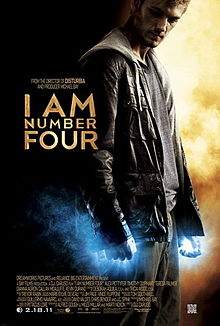 Dianna Agron bounced around Hollywood for a while, doing small roles in films, and a couple of reoccurring characters on TV until Glee became a smash. Now, the young actress has achieved some fame, and has had better roles in the motion pictures. A charming and thoughtful interview, Agron was new to me as I haven’t watched her hit show, but in I Am Number Four, she comes across as an actress to keep an eye on. Our sitdown went well.
Dianna Agron bounced around Hollywood for a while, doing small roles in films, and a couple of reoccurring characters on TV until Glee became a smash. Now, the young actress has achieved some fame, and has had better roles in the motion pictures. A charming and thoughtful interview, Agron was new to me as I haven’t watched her hit show, but in I Am Number Four, she comes across as an actress to keep an eye on. Our sitdown went well.
How familiar were you with these series of books? And what was the audition process like?
I believe they were finishing the book while they were working on the script. So I received the book five weeks into shooting. And there was part of me that wanted to read it so I started it. And then I started noticing differences – slight, but they were there. And I thought I better put this to rest until we’re done with this thing. The audition process was interesting. It kind of came full circle because I had known about the project but just a little. I met Steven Spielberg last January during an awards show. It was incredible. I have a friend in casting at DreamWorks and she said “I want you to meet Stephen.” I didn’t assume that she was talking about Steven Spielberg. I just thought “oh, Stephen, maybe that’s her husband.” I don’t know. But, and so he comes over and says, “We have this movie, I Am Number Four and you’d be perfect for this character Sarah. But I think we’re filming in fall and I know you’ll be back to Glee. And so it wouldn’t work out. But I think that the show is great and you’re great and it’s nice to meet you.” And he walked away. I was like “what just happened?” That was Steven Spielberg.
You are at an awards show?
Yeah, we were up for all those awards last year and then there’s a charity event that him and Katzenberg and all of them have. So I was there for my friend at DreamWorks. And that was wonderful experience. Once they moved the project to the summer… still they thought “oh, this won’t work out because she’s going on tour with the show.” And my manager at the time, she was very persistent thankfully, and we made it work. Both sides were just really willing to work with each other. And I met DJ and we really responded well to each other and he liked my take on the character and that’s kind of where he saw her. And the rest is history.
What appealed to you about the character of Sarah?
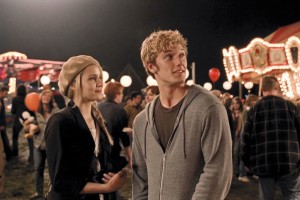 Well I liked — I always like to play something different. It doesn’t have to be worlds apart but there has to be something new, some challenge. And I like that she was at the crossroads. I liked that she had left her friends behind in a very nonjudgmental – she wasn’t an elitist – way. They weren’t supportive and at the end, they turn on her and she realized “I’m going to be myself. Whoever likes it, come along. Whoever doesn’t, it doesn’t really matter.” I liked that she had this old soul sensibility to her. At least that’s what I saw when I read it. And I thought that the love story was really beautiful and I was really excited to get into the action sequences even though I only had a small part. I was like “this is going to be awesome. I’m going to see it all!” And it was. It was all of what I expected.
Well I liked — I always like to play something different. It doesn’t have to be worlds apart but there has to be something new, some challenge. And I like that she was at the crossroads. I liked that she had left her friends behind in a very nonjudgmental – she wasn’t an elitist – way. They weren’t supportive and at the end, they turn on her and she realized “I’m going to be myself. Whoever likes it, come along. Whoever doesn’t, it doesn’t really matter.” I liked that she had this old soul sensibility to her. At least that’s what I saw when I read it. And I thought that the love story was really beautiful and I was really excited to get into the action sequences even though I only had a small part. I was like “this is going to be awesome. I’m going to see it all!” And it was. It was all of what I expected.
Was that your first time working with a green screen?
Yes, although it was very limited. And because a lot of the stuff– well actually they built this big blue thing that had kind of the shape of the mogs. The mogs have these crazy creatures that are dinosaur looking, Pikens. And they built this thing and it was blue and it had to be behind the big window in the cafeteria and it was so strange. In retrospect it really doesn’t look like the Pikens. And we were all joking about it because it was massive. Uh, but for the most part that wasn’t there and it was just look at this window and it comes through here and it’s going to end up about here and you need to go there. And run fast. So you would. Yeah, you felt like a kid and use your imagination. “Okay go!” I loved it. I loved it.
Talk about meeting Alex. You said you met through DJ.
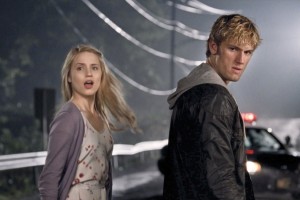 Well that was misconstrued, because DJ had suggested that we meet because we hadn’t. Usually as actors – especially going in for romantic interest in a movie – you meet and you test to see if there’s chemistry that can be had. And we didn’t have that and we were about to have a table read with the entire cast and DreamWorks executives. It’s common that people can be fired at a table read if the characters don’t gel and if things don’t work out. So I agreed with him, “Yes, let’s meet each other. I would like to see what I can bring to this so I don’t lose my job.” So we met the day before the table read and they set up a dinner. DJ had said– I don’t know if he ever intended on going. I don’t know if it was a trap to get us both in there. He was like “I’ll go have dinner with you guys.” But DJ also has a life. He has five kids. He was getting ready to do a movie. And so Emily called and she said “DJ, he might stop by but just start the dinner and whatever.” It’s a set up. And, it is strange because always I’ve met the actor either in the audition or onset. And so you’re thinking “okay I guess it’s like we have to talk to each other about where we’ve been and we should really talk about the characters, right? Because that’s weird.” We’re not there yet. It was dinner and it was just funny because there were certain things. Obviously I knew he was British so he probably has a British accent. He’s probably this and that. But it, I think, really helped at the table read because that feeling of nervousness we had gotten out at dinner and we at least had a stepping stone and they didn’t fire us. Well, they wouldn’t have fired him. They picked him first. They would’ve fired me. And then I wouldn’t be here.
Well that was misconstrued, because DJ had suggested that we meet because we hadn’t. Usually as actors – especially going in for romantic interest in a movie – you meet and you test to see if there’s chemistry that can be had. And we didn’t have that and we were about to have a table read with the entire cast and DreamWorks executives. It’s common that people can be fired at a table read if the characters don’t gel and if things don’t work out. So I agreed with him, “Yes, let’s meet each other. I would like to see what I can bring to this so I don’t lose my job.” So we met the day before the table read and they set up a dinner. DJ had said– I don’t know if he ever intended on going. I don’t know if it was a trap to get us both in there. He was like “I’ll go have dinner with you guys.” But DJ also has a life. He has five kids. He was getting ready to do a movie. And so Emily called and she said “DJ, he might stop by but just start the dinner and whatever.” It’s a set up. And, it is strange because always I’ve met the actor either in the audition or onset. And so you’re thinking “okay I guess it’s like we have to talk to each other about where we’ve been and we should really talk about the characters, right? Because that’s weird.” We’re not there yet. It was dinner and it was just funny because there were certain things. Obviously I knew he was British so he probably has a British accent. He’s probably this and that. But it, I think, really helped at the table read because that feeling of nervousness we had gotten out at dinner and we at least had a stepping stone and they didn’t fire us. Well, they wouldn’t have fired him. They picked him first. They would’ve fired me. And then I wouldn’t be here.
What was it like acting opposite him?
It was great because he was so enthusiastic and so determined to give everything he had to this character. He was training for months and it paid off immensely I think because the stunts are so incredible in this film. And you always wants somebody that’s, I like to call them “responsible actors.” You know, shows up on set on time, isn’t hard to get them out of the trailer, people that when you deliver a line one way in the scene don’t do things to mess you up and completely – it’s a catching game and you have to listen to what they say and respond accordingly, even if you read it before hand and kind of had an idea of, “I think this is the beat to hit.” You just really have to work it out in the scene for it to be organic. So he had all those good things. We didn’t have to drag him out of his trailer. He wasn’t a diva. So that was good.
How do you go about balancing a very full schedule with a number of films you been doing with Glee?
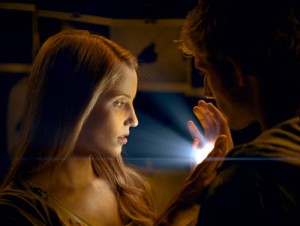 Through teams of people that are wonderful and have experience with it. There was a bit in the beginning when people on my team said “okay, well, let’s shoot for this film.” And I said “guys, isn’t it supposed to start when I’m filming and isn’t it supposed to end, not too far–.” And they said everything is always changing. So you have to try and if it works then you reap the rewards and if not it’s no big deal. You just weren’t available. So, luckily in the times that I have had off projects that have been interesting have worked into my schedule and this one was the hardest to do because we were touring and then they had to work the schedule around so that the next day I could start on Glee. And there would be no down days so I could go back as quickly as possible. I think I missed the first day of shooting but not even everybody was shooting that first day. And I had to fly back once more for one day of green screen where I could and then fly back. So there wasn’t really any overlap but it definitely required a lot of shifting schedules around, which I’m very grateful for.
Through teams of people that are wonderful and have experience with it. There was a bit in the beginning when people on my team said “okay, well, let’s shoot for this film.” And I said “guys, isn’t it supposed to start when I’m filming and isn’t it supposed to end, not too far–.” And they said everything is always changing. So you have to try and if it works then you reap the rewards and if not it’s no big deal. You just weren’t available. So, luckily in the times that I have had off projects that have been interesting have worked into my schedule and this one was the hardest to do because we were touring and then they had to work the schedule around so that the next day I could start on Glee. And there would be no down days so I could go back as quickly as possible. I think I missed the first day of shooting but not even everybody was shooting that first day. And I had to fly back once more for one day of green screen where I could and then fly back. So there wasn’t really any overlap but it definitely required a lot of shifting schedules around, which I’m very grateful for.
Did that become stressful? Do you worry about bleeding the characters together?
Not really. Only because a lot of the process happens in the makeup chair and through the wardrobe. Quinn and Sarah look very different. I made sure that their speaking voices weren’t the same. Quinn, her voice is much higher and she has beats that she hits with her diction. And so things like that, if you incorporate this I think it’s a really easy way to separate things. I don’t have a difficult time with it. Although one day I went during lunch while I was filming – this was a couple months ago – to go do ADR for the film, dialogue replacement. And we did one take and it was Quinn’s voice. It’s like, “I was just kidding. Sorry. Can I hear Sarah for a second? Okay, cool. I know where we’re at. Lower, lower, lower.” But when you’re onset it’s, it’s the surroundings. It’s everything and you’re kind of put in your place.
Glee is very fantastical in its own way as opposed to the character aspect of this movie, it was grounded in Middle America, very back to the ’50s kind of kids. Do you have anything to say about the differences between the two shows approaches and what you like the best?
I don’t think there’s a favorite in my opinion. I think they’re both so enjoyable and the same messages are there. If you feel like you’re on the outside what do you do: do you quell that or do you stand up for yourself or do you leave it alone? And do you take a different path? I enjoy them both equally.
Is it hard for you to play a teenager?
Well in the beginning of auditioning in LA I read so many things and not every project is one that has great writing. What I would become frustrated with was that often when there was a teenage character it would be stomping and hissing and “mom!” and this and that and “Nobody understands me!” And you just– it’s just such stereotypes. They’re such exaggerated cartoon characters that were kids or just really dumbed down. It’s like from the time that you hit a certain age you’ve got every adult feeling within you and you might express yourself a little differently than you would five years down the line, 10 years down the line, 15 years down the line, but that’s natural. You still have certain sensibilities to you. And I liked that these teenage characters are smart and have real feelings and that’s the same with Glee. I think that’s the best writing is when you, you understand that. And sometimes I feel as if writers – if they are out of touch with their teenage selves take – them to a more eight-year-old place than what might be more realistic.
There seems to be this craving definitely in young adult literature for women, I mean there’s a line, “we don’t love like the humans. We love forever.” And that seems to be a theme for something that’s attractive to young adult women as in Twilight. Why do you think that is?
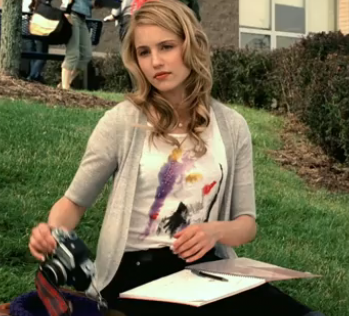 This is my explanation that I’ve been saying and hopefully this makes sense. I think some people can hear that line and think “how sweet.” We’re in what is a disposable country. Everything is disposable. Relationships, the car breaks down, let’s get a new one. This keeps breaking down. “My computer it’s kind of acting weird. Maybe it’s been two years. I should probably just get a new one.” And then certain things are made to break quickly. So we’re used to turning a new leaf. “I’ll just get a new one.” And that applies often to relationships. Well the statistics say that 80 percent of marriages and this and that. And it’s almost fun for people to say “well, that didn’t work, next one.” Instead of realizing that things can be fixed and oftentimes the things that you love the most should have the most attention and care and work put into them, your families, your friends, your relationships. And in decades past through religion or other ideas, or public scrutiny, many people didn’t get divorced. Divorce wasn’t common. That doesn’t mean that there weren’t people that were unhappy but I think you find the difference. If something is worth putting effort into, maintain that idea and see how far it takes you. And at least try. Now that’s my take on how something can last for a long time and why the idea of maybe only falling for one person can be obtained and why it’s nice to have that message in the film. And I don’t know. I just, yeah, I hope that makes sense.
This is my explanation that I’ve been saying and hopefully this makes sense. I think some people can hear that line and think “how sweet.” We’re in what is a disposable country. Everything is disposable. Relationships, the car breaks down, let’s get a new one. This keeps breaking down. “My computer it’s kind of acting weird. Maybe it’s been two years. I should probably just get a new one.” And then certain things are made to break quickly. So we’re used to turning a new leaf. “I’ll just get a new one.” And that applies often to relationships. Well the statistics say that 80 percent of marriages and this and that. And it’s almost fun for people to say “well, that didn’t work, next one.” Instead of realizing that things can be fixed and oftentimes the things that you love the most should have the most attention and care and work put into them, your families, your friends, your relationships. And in decades past through religion or other ideas, or public scrutiny, many people didn’t get divorced. Divorce wasn’t common. That doesn’t mean that there weren’t people that were unhappy but I think you find the difference. If something is worth putting effort into, maintain that idea and see how far it takes you. And at least try. Now that’s my take on how something can last for a long time and why the idea of maybe only falling for one person can be obtained and why it’s nice to have that message in the film. And I don’t know. I just, yeah, I hope that makes sense.
Since your success with Glee, has it opened up doors and is it easier to get roles as far as movies, or is it harder?
It’s a double-edged sword because sometimes production companies or producers are afraid that if you do have a hiatus that if the movie goes over or problems arise that they’re going to run into problems with their own production and getting things done. Sometimes people do want that public awareness in an actor to contribute to their film. Other times they want somebody that is unknown and you may love the project and they say oh, well, I want an up-and-coming. Like, I am an up-and-coming. “Ah, people know you. You’re a cheerleader.” I’m like “oh, God.” It’s all about the right projects and timing and just trying not to do too many things that you don’t believe in just because they work out timing-wise, schedule-wise. And then look for things that speak to you and do end up working out. But I see both sides to it, which has been really interesting. The better side to it is yes, Glee has given me the opportunity to be in rooms and have something to talk about and have ideas and have people listen and contribute and it’s just an onward journey. Yeah.
I Am Number Four opens tomorrow.